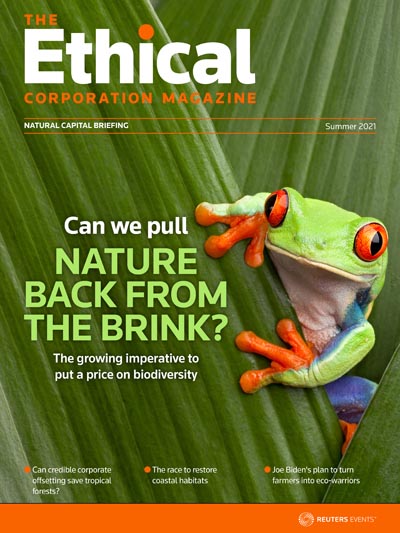The summer issue of Reuters Events Sustainable Business's quarterly magazine looks at the growing business imperative to put a value on natural capital, and how leading corporates are integrating biodiversity into their strategies to address climate change
Biodiversity is critically important to human health and livelihoods – indeed continuing life on this planet – yet it is declining faster than at any other time in history. The International Union for Conservation of Nature warns that more than 31,000 species – 27% of all the species it assesses – are threatened with extinction.
In February, the Dasgupta Review, which was commissioned by the UK government, broke new ground by exploring the relationship between biodiversity and economics, and found that there has been a 40% drop in the stocks of natural capital between 1991-2014, seriously harming nature’s ability to regenerate.
This has profound impacts on the world’s capacity to fight climate change, given that nature-based solutions could provide 23% of the mitigation battle by 2030, and also help in climate adaptation.
In this issue of The Ethical Corporation, we look at how big the blind spot is and how companies, policymakers and investors are beginning to rise to the challenge of valuing natural capital, and integrating it into their business models and strategies to address climate change.
In the opening article, Mark Hillsdon sets out what is at stake, and reports on the plethora of initiatives that are working to bring nature into focus for the finance industry and corporates.

The increasing number of companies eschewing single-use plastics for bio-based packaging is raising concerns that soaring demand for forest products, will swap one environmental disaster for another. Sarah LaBrecque reports on a campaign to kickstart reuse models and more sustainable packaging alternatives.
She also looks at the sustainability of sugarcane as a bio-based alternative to plastic.
With the new U.S. administration putting a focus on agriculture as a way of combating climate change, Mark Hillsdon reports on President Biden’s plan to pay America’s farmers to practice regenerative practices like cover-cropping, crop rotation and managed grazing.
He also looks at how forestry offsets company SilviaTerra is helping America’s small landholders, who own a third of its forests, gain access to carbon finance, how Tennessee’s Stony Creek Colors is turning tobacco farmers into sustainable indigo suppliers for jeans companies, and how Zimbabwean farming pioneer Esnath Divasoni is promoting regenerative agriculture through educating girls.
Angeli Mehta turns her gaze to developments in the EU, where green groups are up in arms over the European Commission’s controversial decision to include biomass for energy in its new rules for sustainable investment.
Oliver Balch talks to Canopy founder Nicole Rycroft about the companies that are responding to the urgent need to scale up sustainable alternatives to wood-based materials like viscose in the fashion industry.
And I report, with Thomson Reuters Foundation’s Harry Jacques, on how San Francisco non-profit Rainforest Connection is fighting illegal deforestation in a dozen countries in partnership with some of the world’s largest tech companies.

But protecting biodiversity and the carbon-sequestration potential of land and forests is only part of the battle. The value of “blue carbon” locked up in oceans is estimated to be even greater. Angeli Mehta reports on the companies that are innovating to scale up protection of seagrass and other coastal habitats. She also looks at Mars Inc’s community-centric approach in the world’s largest coral reef restoration project in Indonesia.
Mike Scott looks at how companies are reducing their impacts on nature in their operations as part of their net-zero plans, including Chipotle Mexican Grill, Unilever, Heineken, Timberland and Nomad Foods, while Mark Hillsdon profiles Natura & Co, Kering and Olam.
I assess the potential impact of the newly launched LEAF coalition, a $1bn a year programme to fund forest conservation through carbon offsets, which is backed by the U.S., Britain and Norway, alongside nine multinational companies including Salesforce, Amazon, Unilever and Nestlé.
And Oliver Balch ends the issue with a thought-provoking interview with Dr Jonathan Foley, director of Project Drawdown, who expresses scepticism about corporates’ newfound embrace for regenerative agriculture, when they have failed to tackle food waste.
I hope you enjoy this bumper summer issue of The Ethical Corporation. You can download it for free by clicking on the cover below.
In August we will be turning our attention from nature to the race to decarbonise the built environment and cities.
Main picture credit: Simon Bratt/Shutterstock


